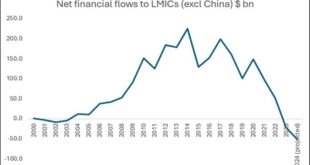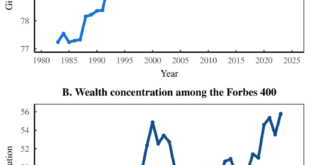Planet is headed for at least 2.5C of heating with disastrous results for humanity, poll of hundreds of scientists finds
Read More »Water Flowing Upwards: Net financial flows from developing countries
from C. P. Chandrasekhar and Jayati Ghosh Once again, low and middle income countries (LMICs) are at the brutal receiving end of the fickle trajectory of international capital flows. As Figure 1 indicates, net financial flows to such countries, which increased rapidly after the Global Financial Crisis that began and was created by advanced economies, peaked in 2014. Thereafter, they have been on a downward trend, which has accelerated dramatically from 2021, to the point that they turned...
Read More »The non-existence of economic laws
from Lars Syll In mainstream economics, there’s — still — a lot of talk about ‘economic laws.’ The crux of these laws — and regularities — that allegedly exist in economics, is that they only hold ceteris paribus. That fundamentally means that these laws/regularities only hold when the right conditions are at hand for giving rise to them. Unfortunately, from an empirical point of view, those conditions are only at hand in artificially closed nomological models purposely designed to give...
Read More »In search of radical alternatives
from Crelis Rammelt and current issue of RWER Our presumed dominion over nature is an illusion. No matter how clever technological innovations may seem, they remain subject to the laws of thermodynamics. Consequently, a growth-centered capitalist economy finds itself trapped in futile attempts to completely decouple itself from nature – aiming for a 100% circular, service-oriented and zero-waste existence. This obsession stems from an incapacity to imagine an economy that does not grow,...
Read More »Cutting-edge macroeconomics …
from Lars Syll No sooner had I finished my comment on the irrelevancy of economics but I had confirmation — albeit unwittingly — in this morning’s Financial Times. There on the editorial page was a short column by Soumaya Keynes talking about the rise of Hank. For those of you not on the cutting edge, “Hank” stands for Heterogeneous Agent New Keynesian, as in a complicated model of the economy. Hank is a whole new way of looking at model economies, with the really big breakthrough being...
Read More »The eclipse part wo
from Peter Radford What are we to say of a discipline that steadfastly ignores reality in its pursuit of ever more formality in its methods? Wow. Steve Levitt has really shaken me. I come not to mock, but to follow up … Stand up and take a bow Ben Moll! You daring soul. Clearly I need to explain. No sooner had I finished my comment on the irrelevancy of economics but I had confirmation — albeit unwittingly — in this morning’s Financial Times. There on the editorial page was a short...
Read More »Chang’s “Edible Economics”
from Junaid Jahangir and current issue of RWER [Ha-Joon] Chang’s latest book Edible Economics (2022) crystallizes the narrative that he has developed through his popular books over the years. . . . I have reviewed the salient ideas as follows in a bid to draw out lessons I could share with my ECON 101 students. . . . the main ideas of Ha-Joon Chang can be distilled in point form as follows. Neoclassical economics gives precedence to mathematics over real-world issues of inequality and...
Read More »Chicago economics — nothing but pseudo-scientific cheating
from Lars Syll Unlike anthropologists … economists simply invent the primitive societies we study, a practice which frees us from limiting ourselves to societies which can be physically visited as sparing us the discomforts of long stays among savages. This method of society-invention is the source of the utopian character of economics; and of the mix of distrust and envy with which we are viewed by our fellow social scientists. The point of studying wholly fictional, rather than actual...
Read More »The increasing collusion between . . . . . .
from a comment by Ikonoclast “A truth is permitted only a brief victory celebration between the two long periods where it is first condemned as paradoxical and later disparaged as trivial.” – Arthur Schopenhauer. As they break new ground, the Capital as Power theoreticians will encounter the “Schopenhauer Effect” over and over. When you point out something clearly for the first time, or even again after a long interregnum when few could see it, then everyone will say, “Oh, we always knew...
Read More »Wealth catapulted up
from Blair Fix and current issue of RWER Speaking of competition and losers, Ronald Reagan set the tone of the neoliberal era when, in 1981, he fired 11,000 striking air-traffic controllers (Houlihan, 2021). The message? Workers were losers who would be subjected to the discipline of competition. Reagan called it ‘morning in America’. But really, it was ‘morning for American big business’. Today, we are well into the next-day’s hangover, and we know how the party played out. For workers,...
Read More » Real-World Economics Review
Real-World Economics Review




